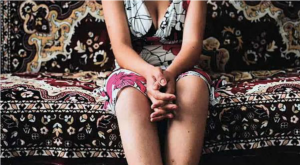“I have the same thoughts now as I did back then. I wish I’d never been born. I’d be better off dead than living like this.” Living like this meant living in a brothel, treated like some sort of cheap commodity day in and day out. Having been taken from her home in Moldova when she was only 18 years old, Jenea was lured to “Moscow” with the promise of a cleaning job. She would be making $200 a month, indescribable riches compared to the measly sum she was making in the fields. With the permission of her parents, she left her hometown. Little did she know, she would never return.
In the airport, she realized that “Moscow” was really Turkey. Warned that if she went to the police, she would have to pay back her own travel expenses, the documents and ticket costs, Jenea realized that she was trapped. And in debt.
Jenea is one among millions of women who are essentially modern day slaves- sold from traffickers to pimps to eager clients from around the world. Initially, these women are locked into the brothels by their debts from travel, but quickly those debts multiply with steady ferociousness. Each action is accounted for– room and board, showers, clothing– and not a single dollar that they earn reaches their pockets.
More than just debt keeps them in the brothels. They are trapped in. They are beaten and raped to the point of utter submission. They are threatened with death. They are put on drugs so that even in the rare situation of escape, many return on account of withdrawals. As documentary filmmaker, Mimi Chakarova puts it, “They’ve been broken and believe there is no other choice.”
The issue of human trafficking, however, goes deeper than Jenea, feelings trapped and degraded as a human being. It goes deeper than the boys forced to pound clay into bricks for hours on end to pay off an unpayable debt. It goes right down to the way we view the human beings around us, not as people, but as potentials for profit. Humans are used across the globe to boost status, to boost power, to boost wealth.
Though human slavery is illegal worldwide, it is looked over so frequently, because those with the power to stop it have vested interest in its continuation. Police officers make money off of bribes from pimps. Government officials frequent brothels as customers. Products can be made much more cheaply, when the workers ARE NOT PAYED for their labor.
But not only do the people with political or economic clout keep such a system going; so do the consumers. We have created an industry for human trafficking. In our purchases, we endorse the forcing of children into factories where they lose their childhood, their opportunity for education, and sometimes, even their fingers; we applaud the debt bondage of men, chained to their jobs in mines and fields as the only way to pay off a constantly growing debt; we condone the system in which harvesters never see more than a couple of dollars of their sales. Each time we buy a top from Forever 21 or a tablet from Kindle or a pair of shoes from Lacoste, we are supporting the exploitation of human labor.
Quotes from The Price of Sex, a chilling documentary by Mimi Chakarova. http://www.youtube.com/watch?v=y9eBkIy4Uag

Pingback: Force, Fraud, and Coercion | To Stop the Traffick